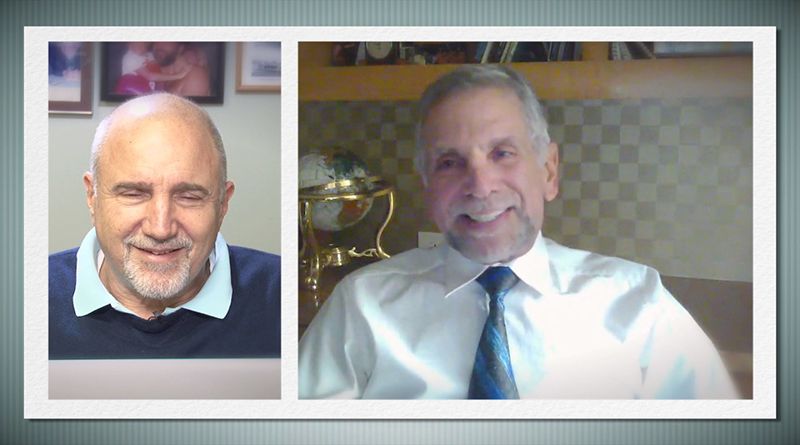An Introduction to Group Therapy, with Dr. Scott Simon Fehr | EDB 188
Psychologist Dr. Scott Simon Fehr explains the basics of group therapy
(18 minutes) Scott is a Licensed Psychologist and Mental Health Counselor, and an adjunct professor at Nova Southeastern University (NSU). There he is part-time core faculty in the Departments of Counseling and Clinical & School Psychology. Scott’s expertise is in group and individual psychotherapy; marriage counseling, corporate consultation, and expert witness testimony. He is the author of several books, with the latest being a third edition of “Introduction to Group Therapy”. He discusses the basics of group therapy, how he got his start in mental health, and how he thinks psychology practices could be improved.
For more information about Dr. Scott Simon Fehr, visit his NSU profile here, and look for his writing wherever books are sold.
AUDIO PODCAST VERSION:
Or look for us on your favorite podcast provider:
iTunes | Stitcher | SoundCloud
FULL TRANSCRIPTION
Meeting Dr. Scott Simon Fehr
HACKIE REITMAN (HR): Hi. I’m Doctor Hackie Reitman, and welcome to another episode of “Exploring Different Brains.” Today, We’re lucky to have with us, from Nova Southeastern University, Dr. Scott Simon Fehr, who’s a psychologist, who has written seven; that’s right: seven books on group therapy! Doctor, welcome!
SCOTT SIMON FEHR (SF): Thank you. Thank you very much! I’m very comfortable if you call me Scott.
HR: Well, You can call me Hackie then!
SF: I was planning on that.
Scott’s introduction to group therapy
HR: Good! (Laughs.) This is going to be… how did you get into this group therapy? How did you get into this?
SF: Ah! Many many years ago, in my early twenties, I had some issues in my life.
HR: I’m shocked!
SF: I know, and one of those issues was, I was painfully shy. Painfully shy! Pro-foundly shy! I never spoke, so I went into therapy and I was rewarded with the greatest therapist that ever lived. And she worked with me and worked with me and eventually, put me into group therapy. And that’s where I found my voice: in speaking to others. So, I’m a great proponent of group therapy.
HR: Can we mention that wonderful therapist who helped you?
SF: She’s no longer alive, and her name was Elizabeth.
HR: Did she work with you in a group, or individually?
SF: Well, I saw her first individually, and she did something with me that was highly unusual; we’re talkin’ over 50 years ago. Because I was so shy, I didn’t speak, and she was an Orthodox Freudian analyst. You know, you’re on the couch. Well, I was on the couch and didn’t speak. Then, she tried putting me in a chair, and I didn’t speak. And then, she thought, “I got to do something with this guy.” So she started to tell me about her life: something you’re trained NEVER to do, and especially if you’re a Freudian analyst. You don’t disclose anything, and I would identify with certain things that she said, and she would say, “Tell me a little bit more.” And she had a life that was unbelievable. She used to say to me, “Booby, what are you gonna do when your really have a problem?”
HR: So, after that experience, you decided to go into the field.
SF: She pushed me in the field. She felt I had certain, I guess, abilities? Qualities? I tended to elicit feelings and other people; good, bad, whatever. And she really pushed me into the field. I was not going to go onto this field.
HR: Then when you went into this field…
SF: Yes.
HR: If I’m understanding this correctly, she treated you one-on-one.
SF: And in group also.
HR: And in group also. And then when you went out, did you immediately start group, or did you start once you had your education?
SF: I went back to school, finished my undergraduate. got two masters, went on for my doctorate, and came out; probably unrealistic, and I started to practice, and it took off. So, I love group. I think sitting one to one can be a little tiring, but group is always very very active, especially if you run it effectively.
The keys to running a therapy group
HR: What are the tips to running it effectively?
SF: Being able to withstand “heightened emotionality.” Groups are usually between eight and ten people, and it’s very possible for these eight to ten people to all be screaming at the same time. Sometimes the pictures in my office slide.That’s how much yelling there can be. But it’s good, because they’re getting their feelings out, and then everyone leaves his friends again. I make everyone hug each other, but you have to be able to withstand strong emotionality, and to a lot of therapists, this causes them a great discomfort, so they’re more comfortable dealing one-on-one.
HR: Is it hard to talk to clients into group, or they just come to you already knowing that?
SF: Well, two parts: generally, I take clients from my private practice that I see individually, to get them ready. When I feel they’re ready, I then put them in a group.
HR: So, they have to go to you first?
SF: Yes.
HR: I see, and then you make the judgment whether or not they can withstand?
SF: Absolutely, and I can make that judgment sometimes in one session.
HR: What types of conditions do you treat?
SF: When I first started, and I had extensive student loans, I treated everybody and, (laughs) now that I don’t have student loans, I have grown my practice, that I see very high functioning professionals, who are success-oriented and because of that, it causes some interpersonal difficulties in their interpersonal relationships; such as, they’re competitive, and that’s great in business. But, it’s not great in an interpersonal relationship, because as you’re aware, in competition, there’s a winner and loser. Now who the hell wants to be the loser all the time in a relationship? So I smooth them out, hopefully, and I have a great practice.
The most common challenges
HR: Is that the number one problem you see: the competitiveness?
SF: In society, or with my clients?
HR: Both. Each.
SF: Well, in society, the number one problem is self-concentration. “Me before everybody else” and the lack of relatedness. People don’t talk to each other anymore. If you watch, go out to dinner. They’re on their phones. I have students that break off their engagement through a text message. They don’t know how to say thank you. People are not appreciative. I’m sure there are many people that are. I don’t run into a lot of them. So hopefully, through this paradigm that I have been working on for 20 years, I’m helping people become people again.
HR: Can you share with our audience in general terms, the paradigm?
SF: It’s a long name for really a simple explanation: interactive interpersonal psychotherapy. Interactive means you, and I, we talk to each other! I’m not autocratic here. I am not the authority. Basically, you are the authority on your life. I talk to you about your life. But, if you ask me any question, both personal or professional, I will answer it. We’re taught never to do that.
HR: Now, in sharing your personal information with your…
SF: Client.
HR: Client. Do you run into an ethical issues?
SF: There is nothing written that says it’s against the law to disclose yourself. Ethical issues, it depends on what paradigm you’re working from. Now someone who works from a psychoanalytic paradigm may say, “Well, this is unethical! You’re interfering with the trans friends, or the projections, or whatever.” I’m in a profession where they’re always looking to discourage anything that is new and different, but it’s not unethical to do it. I mean, I’m doing this job for 20 years. I’ve never had a complaint.
Misunderstandings about group therapy
HR: In thinking about group therapy, and… let me show our audience. This is the latest book.
SF: Yeah, the third edition of this one.
HR: Third Edition. Group Therapy. “Introduction to Group Therapy: A Practical Guide by Scott Simon Fehr”. What would you say is the biggest misunderstanding by John Q Public about group therapy?
SF: I think the biggest misunderstanding by the lay person is about therapy. Period. Especially here in South Florida. In New York, California, Chicago, Argentina. Your next-door neighbor’s in therapy. But here, in South Florida, it’s considered something you don’t want to tell others about: that you’re in therapy, for fear of being judged. Hackie, everyone should be in therapy at some time in their life.
Maximizing the benefits of group therapy
HR: What would you say to someone who is uneasy about sharing in group therapy?
SF: That’s a very normal feeling. I understand it. I went through it. The first day I went to group therapy, I thought I’d pee in my pants. I was so nervous, but then, one of the extraordinary things about group therapy is, I got to see and listen to people older than myself, who are really quite successful, talking about my problems. So I didn’t feel alone. So, I would say, give it a shot.
HR: Are there certain topics or circumstances that are better for group therapy than individual therapy?
SF: No, I don’t think so. I don’t think so. I think there are certain topics that perhaps the new patient or new client wants to talk about and would feel more comfortable speaking on a one-to-one then in front of a group of people. But, that can be taken care of.
HR: How old is your son?
SF: 39.
HR: What is he doing now?
SF: He is a therapist! He’s a licensed therapist and he works with addictions. And he’s terrific, handsome, well-spoken, and just a terrific therapist.
Scott’s most interesting patients
HR: Who do you find to be your most interesting patients?
SF: If any of them are watching this, I need to be like, really parental. You know, I love all my children the same; I love all my patients the same, and they’re ALL interesting. Hahaha.
HR: Very good!
SF: Thank you!
HR: Let’s put it another way…
SF: Okay.
HR: What is some of the most intellectually interesting conditions that you treat?
SF: Um, I really like treating super bright people and I like creating the super bright people. When they’re out to disprove me; that I’m wrong, and the things that I say to them, and then, they come back and tell me, “You know, doc, you’re right.” (Laughs) I like that.
Improving the therapeutic process
HR: Now, you wrote a piece on LinkedIn about the need for psychology to progress, and to change with Society. Could you elaborate on that?
SF: Society needs to change! It does! It needs to change! I mean, you’re very much aware. You know, look what’s happening in the world. It’s just awful! I really want to change the direction of group therapy.
HR: From what-to-what?
SF: From autocratic to a free-flowing relationship between client and therapist.
HR: Where do you think psychology is falling short, if it is falling short?
SF: This is going to get me in trouble. Are you trying to get me in trouble?
HR: Yes.
SF: Psychology is still trying to find an identity. Okay, after all these years, it’s still trying to find an identity. For example, you came to me, 20 years ago? You’re my patient. They said, “No, we cannot do this anymore.” We’re then following a medical model. But, the reality is, the word “patient” comes from the Greek meaning: one who is suffering; not one who is sick. So, then, they got changed: you’re no longer my patient; you’re my client. We have a business arrangement; you’re my client. Now, there’s certain agencies; you no longer my client; you’re my consumer. It’s really wacky.
HR: You’re no longer a doctor; you’re a healthcare provider.
SF: Oh, is that what I am! (Laughs.) I’m so glad! (Laughs.) You’ve answered my life long question! Hahaha.
HR: Now that you have finished writing your seventh book, which you say is going to be your last book…
SF: Yes sir.
HR: What are your career goals with this stage?
SF: To buy into the answer to that, I would definitely tell you is like, “What do I want to do when I grow up?” Um, I have no idea. But, I trust my feelings. I’ll know when it’s time to retire. I believe I’ll know what direction I want to go in. I’m 75 years old. I want to have fun! You know, I’m a middle-class jewish achiever! Everything has been serious for all these years! You know, work, accomplish, work. (Laughs.) I want to have fun!
HR: How can people learn more about you, if they want to learn more?
SF: Google me. There must be three hundred things about me on Google.
HR: And the latest book, “Introduction to Group Therapy.” It’s been a pleasure to have you.
SF: Thank you. Its really been a pleasure to meet you.
HR: I hope you come back again.
SF: Thank you! I hope you have me back again. You’re a nice guy and you have a nice sense of humor.




